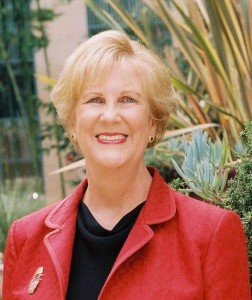Why am I posting about money on Valentine’s Day? Well, I could not come up with anything I liked about LOVE, it’s really only a “Hallmark day” AND money is one of the biggest sources of friction in relationships! (Don’t believe me? Check out this investopedia article (or a zillion others you find when you google relationships and money) – they even have a link to an article on postnuptial agreements!)

My mother-in-law retired a few years ago after creating (and selling) a very successful portfolio management business in Los Angeles that still carries her name. She started out in the 1980s with a series of workshops for women on how to manage their finances. This always interested me, so I asked her to tell me (well…us) more. She answered many of my questions and then agreed to write a series of guest posts for me called “Money Talks.” I think you will find this introductory interview to be interesting (and inspiring).
EF: You started a business in the 80s to help women learn about money. What was the market need you saw and how did you get started?

LA: I had been active in the Women’s Movement for about five years. I felt it was dominated by women wanting to change laws and gain equal access to the workplace, but they were focused on the laws rather than the economics.
Many powerful women in LA at the time were lawyers, but they knew nothing about investing and building wealth. When women around me applied for jobs, they did not ask for their own benefits like health insurance and pensions. They relied on their husband’s benefits.
Key issues that I observed were:
1. Women had no idea what men were earning in the workplace and they were not asking for equal pay (even though that became a slogan of the Women’s Movement). Women were accepting lower pay and part time work just to ”break in.”
2. Lack of communication about finances between married couples. Most of my friends had been married about 10 years and some of the women found that their husbands were not saving, had created debt or were making bad investments. Some women were becoming concerned about their financial futures, but they didn’t know how to influence or take control of family finances.
3. Divorce. I had friends going through divorces that were “cut off” by their husbands and suddenly had no access to the checking or savings accounts. The credit cards were in husbands’ names. Women had to go to work or move back in with their families. Many women found out how naive they had been about money matters.
The fortunate meeting of a mentor launched me into the world of women and finance. I was working for a powerful financial scion at the time that was separating from his wife, Lucille. She had lost her vision to sudden onset glaucoma. I was hired to coordinate her investment advisors, maintain her foundation and be her eyes and ears. She helped me understand the fear and helplessness that so many women felt about finances. She encouraged me to speak out on the subject of “Women and Money.”
I was a psychology major at UCLA and I earned a Masters in Public Health Administration in 1970. I used my research skills and designed a questionnaire about women’s attitudes toward money. I contacted every woman I knew and surveyed over 1,000 women. Lucille gave me the money to have a statistician analyze the data. A control group of men were also surveyed. The results showed the differences in attitudes between men and women were striking.
I pinpointed the attitude differences that I wanted to emphasize and designed a series of six lectures on what women needed to recognize and change. I provided a notebook of course materials and action plans that I thought would give women the tools to make changes to gain financial control of their lives. I called it ”The Economics of Being a Woman.”
I sent out a letter to 200 women that I knew and told them of my plans. I offered the six week courses in my home and enclosed a schedule of classes with an enrollment form. I also signed up with every womens group from Small Business Owners to Junior League to speak on the topic and to advertise. Within a week, three series of six lectures each were filled with 30 students in each at $100 each. As students shared their experiences with friends and spouses, the lecture series developed a long waiting list. I had to hire an assistant to help me with everything.
The first two lectures focused on the “psychology of money” and the last four focused on the tools to gain control of your finances. My emphasis was how to make marriage more successful by becoming a full financial partner (if married) and how to be a successful, financially secure, single woman if you were not. It was all very positive. The women felt connected to and were supportive of one another. I focused on the basics and tried to keep it simple, because one of the myths about finances is that it is complex and boring.
EF: What is the hardest thing for people to understand about money or the biggest mistakes you advise people to avoid?
LA: The hardest thing is to identify your attitudes and fears about money. If we do not understand ourselves, we often sabotage our best efforts.
The biggest mistakes include:
> Not taking the time to learn about budgets, employment benefits, taxes and investments
> Not setting realistic goals
> Taking too much investment risk – people take inappropriate risk because they do not understand risk (the odds of winning or losing)
> Not measuring your progress – you should total your assets and liabilities on a regular basis so you can see your net worth and measure your progress every three months
> Not understanding the mathematics of compounding and (therefore) the future value of investments
> Seeking an unreasonable investment yield
> Not being diversified with real estate, stocks and bonds
> Not knowing when to sell an investment. You should always set a goal for the investment value you are seeking and consider selling when you reach your goal.
> Not designing a lifestyle and figuring out how much it costs to maintain it (determining how much you spend annually)
> Not saving enough
> Buying more material things than you need
[EF: Need help getting started with investing? Check out this great article from Kiplingers with 5 steps for getting started.]
EF: What was the best investment you ever made and the worst?
LA:
> BEST: Starting and developing and then selling my own business.
> WORST: Timeshare in Hawaii
EA: If someone had some money to invest but does not know where to start, what resources would you recommend?
LA: For the Beginning Investor: use Kiplinger Magazine and website to select and monitor mutual funds (not stocks) and to stay current on tax laws and other financial matters.
EA: Interest rates are really low right now for mortgages, savings accounts, CDs, etc. What does that mean for the average person? How can people capitalize on these things?
LA: > When rates are low, you should lock in your mortgage rate at the lowest possible rate for as long as you plan to own your home plus five years.
> When investing, put your funds in a “balanced mutual fund” which contains bonds and stocks to earn a yield between 6 and 8%. [EF: Need help check out this article from Motley Fool or this one from Forbes on picking mutual funds. But, Libbie will do a post on this topic, too!]
> Use savings accounts for emergency funds only (one to two months of expenses).
Libbie’s first “Money Talks” post will be on compounded interest and saving for retirement. What burning questions do you have for a seasoned financial professional?
PS. Don’t forget to “like” my page on Facebook for a chance to win some Tees for Change or Smart Wool gloves – check out rules and leave a comment HERE.

